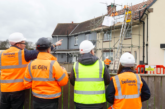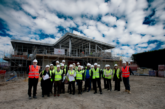Industry experts have called for greater standardisation, collaboration and incentivisation to make Modern Methods of Construction (MMC) work at scale.
Specialists from law and finance have said that whilst MMC could be the sector’s opportunity to cultivate a sustainable future, ‘significant barriers’ to creating viable, scalable, and tangible growth projects still remain.
Ian Atkinson (pictured above), Construction Partner at law firm Womble Bond Dickinson, explained: “For many, the prospect of the upfront investment in MMC is not sufficiently weighted against the short-term financial benefits needed to drive the progress towards bigger, faster and more profitable projects.
“Whilst we’ve discussed the argument for incentivising MMC to speed up adoption, it’s a shift by volume housebuilders that has always been the move needed to pave a realistic path forward for the whole sector.”
Industry standards and collaboration
Ian continued: “There needs to be a significant advancement in industry standardisation to ensure that MMC products are scalable, profitable and increasingly mortgageable.
“At the moment only 8% of homes are built in the UK using MMC according to RICS. To ensure MMC grows in scale and at pace, we need to see more standardisation — in its methods, design and new technologies. By developing common parts, standard sizing and shared processes, economic and environmental efficiencies will follow.
“Standardisation would also offer greater protection for housebuilders. With so few working at scale with MMC in the residential sector, contractors are at considerable risk if one of their MMC suppliers, for one reason or another, can no longer deliver their contribution to the project. If parts and processes are standardised, it will be much easier for alternative suppliers to step into projects.
“Architects and design professionals all have a role to play too — in fully understanding the ever-growing MMC technologies, advising clients on whether MMC is suitable for their projects, and increasingly collaborating with each other, contractors and the supply chain to make MMC projects a success.
“We are already seeing successful collaboration in action through the Buildoffsite Property Assurance Scheme (BOPAS) – jointly developed alongside RICS, Lloyd’s Register and BLP Insurance — which has given lenders more confidence in the quality, durability, and the mortgageability of MMC homes.”
‘Buy to help’ incentivising consumers to choose MMC homes
Whilst lessons can be learned from the MMC-led construction of commercial retail, hospitals, schools and prisons — all of which contribute to MMC’s scalability potential in the residential sector – emphasis needs to be placed on the fact that consumers generally want more diverse homes. Industries must support a credible counterargument for the perceived lack of aesthetics in MMC and find a way to stimulate demand. Ian thinks it may be time to redirect encouragement to the consumer, suggesting: “Rather than incentivising the private sector to build, it is perhaps time to incentivise the consumer to buy. Much like ‘help to buy’, the MMC sector may be crying out for the carrot to motivate consumers to choose a home that could contribute to net zero targets — a ‘buy to help’, if you will.”
The funding landscape
Another key to unlocking the scalability of MMC is access to funding. Joseph Worland, Associate Director (Housing) at Lloyds Bank, explained: “Most MMC is embedded within existing build methods and is considered normal course of business; these include panelised systems and individual pods for bathrooms and kitchens. The key challenge from a funding perspective is whole-house volumetric systems that utilise completely different supply chains and delivery methods than traditional housing. As the volumetric industry matures, we will see a more standardised approach to lending against MMC assets, and this will be supported by evidence of sustained and stable pipeline generation across the industry.
“We’ve seen a steady increase in uptake of MMC in recent years, whether through volumetric, panelised or other systems, each of which has its own use case and suits certain sectors better than others. In the housing sector we have seen the larger builders introduce MMC to a significant proportion of their homes, supported by ambitions on build quality and sustainability. This is complemented by new players in the market which can be a real force for incrementally increasing the supply of homes in the UK.”
What is the future of scalable MMC? Ian concluded: “As MMC continues to drive conversation in the sector and build real momentum on a larger scale, it’s important to explore the challenges and opportunities that exist and how businesses can find the right fit for scalable, sustainable and profitable construction.”
For more information on Womble Bond Dickinson’s rebuild Britain campaign, visit www.womblebonddickinson.com/rebuild-britain.









